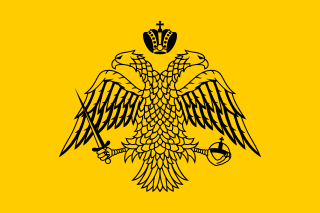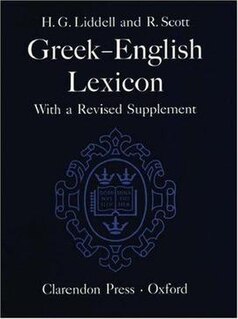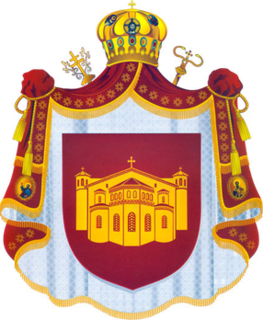
The Eastern Orthodox Church, also called the Orthodox Church, is the second-largest Christian church, with approximately 220 million baptized members. It operates as a communion of autocephalous congregations, each governed by its bishops and adherents in local synods. The church has no central doctrinal or governmental authority analogous to the head of the Roman Catholic Church—the Pope—but the Ecumenical Patriarch of Constantinople is recognized by them as primus inter pares and regarded as the spiritual leader of many of the eastern Christian parishes. As one of the oldest surviving religious institutions in the world, the Eastern Orthodox Church has played a prominent role in the history and culture of Eastern and Southeastern Europe, the Caucasus, and the Near East. The Eastern Orthodox Church officially calls itself the Orthodox Catholic Church.

The Eastern Orthodox Church, officially the Orthodox Catholic Church, is a communion comprising the fourteen or sixteen separate autocephalous (self-governing) hierarchical churches that recognise each other as canonical (regular) Eastern Orthodox Christian churches.

The Russian Orthodox Church, alternatively legally known as the Moscow Patriarchate, is the largest autocephalous Eastern Orthodox Christian church. It has 194 dioceses inside Russia. The primate of the ROC is the Patriarch of Moscow and all Rus'. The ROC, as well as its primate, officially ranks fifth in the Eastern Orthodox order of precedence, immediately below the four ancient patriarchates of the Greek Orthodox Church: Constantinople, Alexandria, Antioch, and Jerusalem.

In many Christian denominations, an archbishop is a bishop of higher rank or office. In some cases, such as the Lutheran Church of Sweden and the Church of England, the title is borne by the leader of the denomination. In others, such as the Roman Catholic Church, there are many archbishops who either have jurisdiction over an ecclesiastical province in addition to their own archdiocese, or are otherwise granted a titular archbishopric.

The ecumenical patriarch is the archbishop of Constantinople–New Rome and primus inter pares among the heads of the several autocephalous churches which compose the Eastern Orthodox Church. The ecumenical patriarch is regarded as the representative and spiritual leader of Orthodox Christians worldwide. The term ecumenical in the title is a historical reference to the Ecumene, a Greek designation for the civilised world, i.e. the Roman Empire, and it stems from Canon 28 of the Council of Chalcedon.

Autocephaly is the status of a hierarchical Christian church whose head bishop does not report to any higher-ranking bishop. The term is primarily used in Eastern Orthodox and Oriental Orthodox churches. The status has been compared with that of the churches (provinces) within the Anglican Communion.

The highest-ranking bishops in Eastern Orthodoxy, Oriental Orthodoxy, the Catholic Church, the Hussite Church, and the Church of the East are termed patriarchs.
Patriarchate is an ecclesiological term in Christianity, designating the office and jurisdiction of an ecclesiastical patriarch. According to Christian tradition three patriarchates were established by the apostles as apostolic sees in the 1st century: Rome, Antioch, and Alexandria. Constantinople was added in the 4th century and Jerusalem in the 5th century. Eventually, together, these five were recognised as the pentarchy by the Council of Ephesus in 431.

The Greek Orthodox Church is the body of several churches within the larger communion of Eastern Orthodox Christianity.
An ecclesiastical province is one of the basic forms of jurisdiction in Christian Churches with traditional hierarchical structure, including Western Christianity and Eastern Christianity. In general, an ecclesiastical province consists of several dioceses, one of them being the archdiocese, headed by a metropolitan bishop or archbishop who has ecclesiastical jurisdiction over all other bishops of the province.

Russian Orthodoxy is the body of several Churches within the larger communion of Eastern Orthodox Christianity, whose liturgy is or was traditionally conducted in Church Slavonic language. Most Churches of the Russian Orthodox tradition are part of the Eastern Orthodox Church.

A Greek–English Lexicon, often referred to as Liddell & Scott or Liddell–Scott–Jones (LSJ), is a standard lexicographical work of the Ancient Greek language originally edited by Henry George Liddell, Robert Scott, Henry Stuart Jones, and Roderick McKenzie and published in 1843 by the Oxford University Press.

The Latvian Orthodox Church is a self-governing, i.e. autonomous, Eastern Orthodox church under the jurisdiction of the Patriarchate of Moscow. The primate of the church carries the title of Metropolitan of Riga and all Latvia. This position has been occupied since October 27, 1990, by metropolitan Aleksandrs Kudrjašovs.

The Macedonian Orthodox Church – Archdiocese of Ohrid, also called Macedonian Orthodox Church – Ohrid Archbishopric (MOC-OA) or simply the Macedonian Orthodox Church (MOC), is an autocephalous Eastern Orthodox church in North Macedonia. The Macedonian Orthodox Church claims ecclesiastical jurisdiction over North Macedonia, and is also represented in the Macedonian diaspora. The primate of the Macedonian Orthodox Church is Stefan Veljanovski, the Metropolitan of Skopje and Archbishop of Ohrid and Macedonia and of Justiniana Prima.

The Ukrainian Orthodox Church (UOC), commonly referred to as the Ukrainian Orthodox Church of the Moscow Patriarchate prior to 2022, is an Eastern Orthodox church in Ukraine, formerly under the jurisdiction of the Russian Orthodox Church (ROC).
A canonical territory is, in some Christian denominations, a geographical area seen as belonging to a particular bishop or Church as its own when it comes to ecclesiastical matters. The concept is found both in the Eastern Orthodox and Roman Catholic Churches.

Today 84% of the population in Georgia practices Orthodox Christianity, primarily the Georgian Orthodox Church. Of these, around 2% follow the Russian Orthodox Church, around 5.9% follow the Armenian Apostolic Church and 0.8% are Catholics and are mainly found in the south of Georgia but with a small number in its capital, Tbilisi.

The Belarusian Orthodox Church is the official name of the Belarusian Exarchate of the Russian Orthodox Church in Belarus. It represents the union of Russian Orthodox eparchies in the territory of the Republic of Belarus and is the largest religious organization in the country, uniting the predominant majority of its Eastern Orthodox Christians.
kephalē appears some 75 times in the Greek New Testament. It is of considerable interest today because of differences of biblical interpretation between Christian egalitarians and Complementarians as to the intent of the New Testament concerning roles of authority assigned biblically to husbands and wives. A prime example appears in Ephesians 5:21-24 where all Christians are told:

The canon law of the Eastern Orthodox Church consists of the ecclesiastical regulations recognised by the authorities of the Eastern Orthodox Church, together with the discipline, study, and practice of Eastern Orthodox jurisprudence.











